歌剧中的骄傲:“不敢说出名字的爱”唱响最高音
文:司马勤(Ken Smith) 编译:李正欣
早在2017年,“新”纽约市立歌剧院(正式的名称是“纽约市立复兴歌剧院”,NYCO Renaissance)第二轮演出季的压轴好戏——彼得·艾特沃施(Péter Eötvos)的《天使在美国》(Angels in America)美国首演——门票卖得满堂红,让破产后重组的歌剧院大展雄风。姑且不说作品的制作水平有点“营养不良”,无法跟歌剧院最辉煌的年代相比;歌剧本身也显得“营养不良”:托尼·库什纳(Tony Kushner)历时8个小时的、获得普利策戏剧奖的、深度思考艾滋病与同性恋的话剧,浓缩至两小时的歌剧版,音乐风格恐怕太接近“音乐剧”(musicalization)。换句话来说,话剧原版(虽然没有人演唱)显得更富有歌剧性。
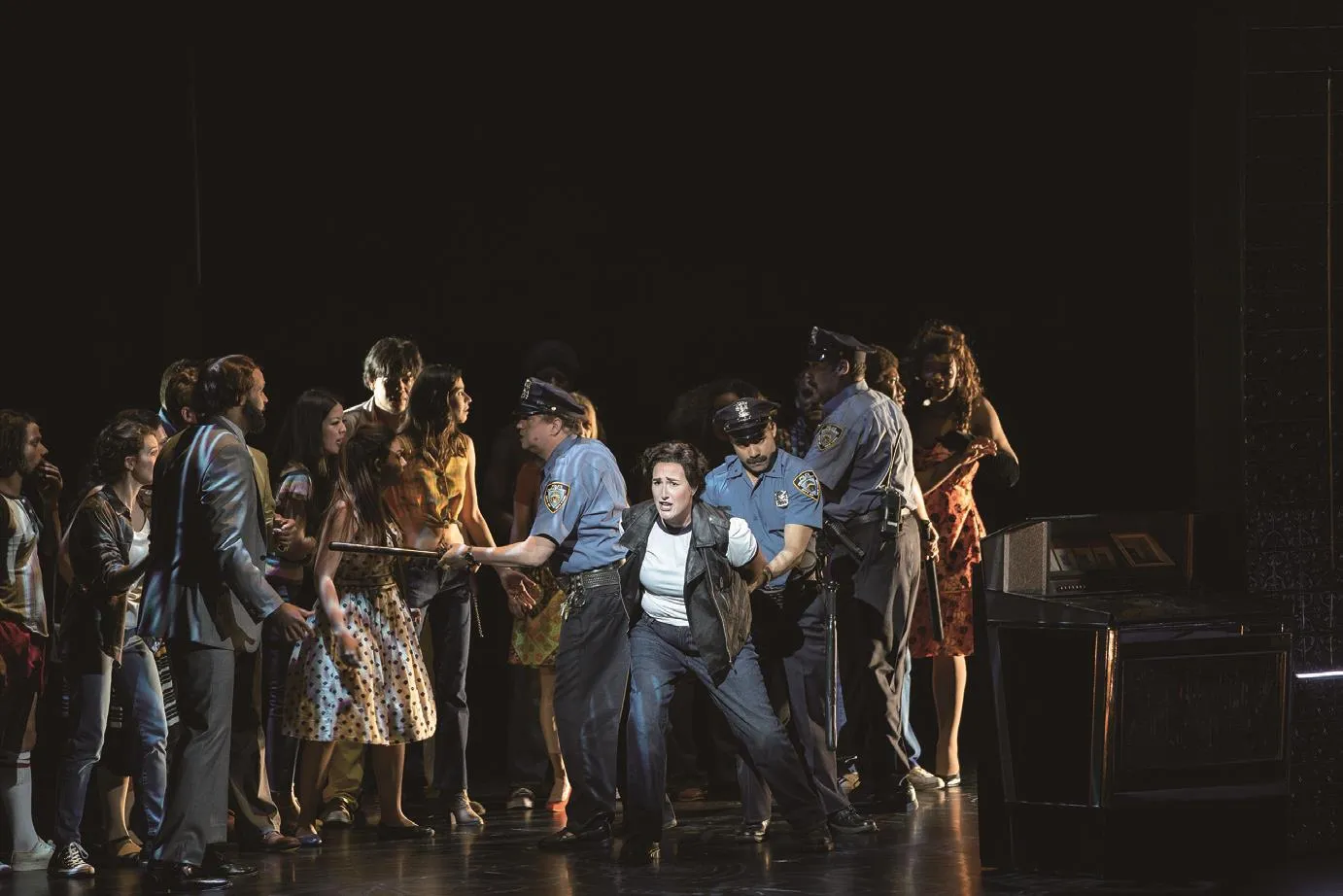
左页、上:纽约市立歌剧院制作的歌剧《石墙》剧照
尽管如此,这个制作仍然引发了不少新闻媒体的重点关注:纽约的“人民歌剧院”把20世纪末最典型的纽约故事搬上舞台。谁料这场演出只不过是个“序幕”,那天晚上有更大的消息传来:当演员谢幕离开舞台后,歌剧院的新任总经理迈克尔·卡帕索(Michael Capasso)随即走了出来,宣布从此之后每年的6月都会搬演一套同性恋题材的歌剧。
可以预见的,观众立刻爆发出热烈的掌声。但是,掌声过后,却又有种困惑的沉默。步出剧院时,有人开口问道:“你觉得吗,这样安排是不是有点多余?”
很多人认为,歌剧是一种展示毫无隐瞒的感性主义的综合艺术。按照这个定义,歌剧与同性恋人群所追求的感性主义如出一辙。歌剧粉丝有很多种类,但其中最显眼的——也可能在西方舞台文化中最为顽强的性格类型——是“歌剧女王”(opera queen)。如果你经常观摩歌剧演出,你必定会遇上那些较为女性化、热心投入歌剧艺术的男性观众。《牛津英文词典》中对这一词语的解说十分到位,定义里还加上了“装模作样的傲慢、刻意打扮得如翩翩君子般。”尽管如此,我在和大都会歌剧院的责任编辑马特·多布金(Matt Dobkin)聊天之后,明白“歌剧女王”不应该只局限于男同性恋者。马特坚称,自己深信痴迷于歌剧至危害健康的人,几乎不受自我性别或性别偏好的限制。不久之后,我目睹了几场关于昆剧技巧的激烈辩论,发现这类“群体”也不应仅限于西方歌剧范畴中。
其实,这种模式化的刻板印象几乎和歌剧本身一样历史悠久(《牛津英文词典》指出首次引用“opera queen”的印刷品,可以追溯到18世纪中叶),但很多专业人士都认为,这群所谓的“皇后”已经没落了。“歌剧皇后”存在的最重要条件,是这群人利用歌剧作为彼此交流的“密码”。但在今天的社会,没有人再需要利用什么“密码”了,自由讨论的空间早已扩大。当戏剧、电影——甚至是新歌剧——在今天以更直接、更现代的方式展开时,谁还会需要20世纪那过时的、公开的情感主义以及性别认知的流动性想法?《纽约客》的音乐评论家亚历克斯·罗斯(Alex Ross)最近发表的一篇文章中,标题尤其开门见山:“歌剧皇后的衰落与同性恋歌剧的崛起。”

纽约市立歌剧院制作的歌剧《石墙》剧照
去年6月,即市立歌剧院宣布推出每年一部同性恋歌剧制作的一年后,歌剧院为观众献上另一套作品迟来的美国首演——查尔斯·沃里宁(Charles Wuorinen)的《断背山》(Brokeback Mountain)。这部作品原本是由杰拉德·莫迪埃(Gerard Mortier)为多年前还未破产的纽约市立歌剧院委约的,但之后由于种种财政问题导致了莫迪埃与歌剧院董事局的决裂,委约事宜当然被搁置。(后来,这部歌剧由莫迪埃亲自带到西班牙,终于在他担任艺术总监的马德里皇家歌剧院首演。)
很不幸,纽约市立歌剧院本年度又遇上了财政问题。今年早些时候,纽约市立歌剧院董事局主席(也是主要捐助者)罗伊·尼德霍夫(Roy Niederhoffer)因为“个人原因”辞职,导致歌剧院今年演出季的节目安排也顿时受挫。可是,市立歌剧院没有辜负众望,而是坚守承诺,把演出季最受瞩目的制作给做了出来。这是一部为了纪念歌剧院成立75周年以及纽约格林尼治村石墙酒吧暴动50周年的委约作品。故事的历史背景是这样的:当年,警察突击搜查石墙酒吧,引致在场的顾客发起暴动,成为同性恋维权运动的标志。
作曲家伊恩·贝尔(Iain Bell)与编剧马克·坎贝尔(Mark Campbell)所创作的《石墙》(Stonewall)在林肯中心的罗斯剧院(Rose Theater)举行首演,最后一场安排于6月28日,正是石墙暴动纪念日,也恰巧是“世界同志游行”(WorldPride)的那个周末(2019年纽约首次成为这个全球活动的主办城市)。《石墙》的情节贴近历史,酒吧的顾客来自不同背景有各自的性倾向——一个男性化的女同性恋者、拉丁裔男同性恋者、黑人女性跨性别者、露宿的白种男人等——大家都意想不到这些人在历史上的这一刻会走在一起。可惜歌剧里很多情节都没有梳理清楚,也失去了焦点。
贝尔的音乐可听性贯彻始终,跟坎贝尔富有魅力的剧本配搭流畅。从声乐设计方面,作曲家清晰地、有效地刻画出不同角色。可是因为时长只有75分钟(没有中场休息),整套作品没有足够的空间让人物或情节沉淀下来。从叙事的角度上看,《石墙》更像一场盛装庆典而不像歌剧,即便里卡尔多·埃尔南德斯(Riccardo Hernandez)的布景与大卫·伍拉德(David Woolard)的服装设计清楚地揭示了歌剧院财政的捉襟见肘。从音乐的角度上看,《石墙》的音乐风格并没有真正反映出那个大时代——显然,在贝尔的构思里,这个故事应该具有超越任何特定年代的永恒性——除了一个特别的注脚:酒吧播放的背景音乐听起来貌似雪莉·贝西(Shirley Bassey,1960年代著名英国歌手)风格的流行曲(背景音乐是预先录制好然后在酒吧点唱机上播放出录音)。这首乐曲其实也是作曲家与编剧整体创作的一部分,酷似1960年代末的流行曲风。

上:委约歌剧《一致》的美国歌剧计划不日将发行该作品的唱片

右:歌剧《一致》2014年首演剧照
相比之下,比《石墙》更成功的歌剧是《一致》(As One)。这是一部关于跨性别者成长的故事,于6月初在纽约重演,由市立歌剧院与纽约梅尔金音乐厅(Merkin Concert Hall)联合制作。从某些层面上说,《一致》与《石墙》是同甘共苦的好伙伴。两部作品的时长都是75分钟;两部剧本都出自坎贝尔的手笔[《一致》也有另一位联合编剧,是跨性别艺术家金伯莉·里德(Kimberly Reed)];两部作品都留有足够空间让观众展开自己的幻想。但是,在这些相似的条件下《石墙》似乎还缺了些什么,但《一致》却令观众洞察到其深度的叙事性。
《一致》早在2014年就进行了世界首演,声称自己是21世纪演出次数最多的新歌剧制作——听起来颇具可信度,因为这部歌剧只需要两位演员和一个弦乐四重奏伴奏。《石墙》中安排了十来个人物的故事,《一致》中却只有一个角色,由两位演员分担——“之前”的男中音与“之后”的女中音。劳拉·卡明斯基(Laura Kaminsky)的后简约主义音乐节奏稳固,保持着持续的脉搏,音乐明显地随着角色的性别而变化,每个段落就像独立的歌曲一样。如果说《石墙》基本上是场盛会,那么《一致》就像一场美化了的卡巴莱(cabaret)秀。《石墙》中没有任何角色有机会可以对应迅速发展的剧情,而《一致》中几乎全是咏叹调;《石墙》讲述的故事深受外来的滋扰,而《一致》的矛盾源自一个人的内心。市立歌剧院已经为我们展现了女同性恋、双性恋、男同性恋与跨性别社群(LGBT)历史中的很多故事。有时候,甚至可以在同一个人身上挖出很多故事。
顺便说一下,委约《一致》的美国歌剧计划(American Opera Projects)不日将发行该歌剧的唱片,由女中音萨莎·库克(Sasha Cooke)与男中音凯利·马克格拉夫(Kelly Markgraf)演唱,他们也是该剧世界首演的主角。上一次我观赏他们俩(在现实生活里,他们是一对伉俪)的演出是在台北,剧目是伯恩斯坦的《大溪地风云》(Trouble in Tahiti)。当时我不禁疑惑,选角的策划人竟然找来一对真正的夫妻演一对婚姻触礁的夫妻,颇有些莫名其妙;这一次更令人目瞪口呆了——他们俩竟然同饰一个跨性别者……
如果市立歌剧院能坚守对于LBGT群体的承诺,继续搬演这类剧目——到目前为止,应该算是院方至今没有打破的唯一承诺——他们应该搬演《哈维·米尔克》(Harvey Milk),因为早在1995年,老的纽约市立歌剧院策划的制作糟糕极了。作曲家惠士钊(Stewart Wallace取的中文名)与编剧迈克尔·科里(Michael Korie)——他们的另外一部作品,《霍普之妻》(Hopper’s Wife),于市立歌剧院 2016 年演出季上演——创作的这部“传记歌剧”(biopera),剧名主角是旧金山著名的选任官员,也是同性恋运动的鼓吹者。《哈维·米尔克》是休斯敦大歌剧院、原纽约市立歌剧院与旧金山歌剧院的联合委约。
20多年前,我曾特地飞到休斯敦出席《哈维·米尔克》的世界首演,喜见歌剧富有感染力与活力,但也遗憾作品结构的混乱。几个月后,我看了纽约版本的《哈维·米尔克》,演出令人失望,舞台也显得无精打采。当年市立歌剧院的总经理兼指挥克里斯托弗·基恩(Christopher Keene)因为排练时间不足,影响了演出的质量。几个月后,患有艾滋病的基恩与世长辞。主创后来做了一些精明的修改,所以《哈维·米尔克》翌年在旧金山的演出十分成功,还录制了唱片,由Teldec公司全球发行。
以上的文字提供了一些值得学习的地方,特别是《石墙》将有机会在伦敦的荷兰公园歌剧院(Opera Holland Park)与巴黎的香榭丽剧院上演。无论在音乐方面或视觉方面,《哈维·米尔克》所营造出来那种壮观场面正是《石墙》所期盼的。但更重要的是,它证明了对于新作品来说,过去有可能是序幕。
Back in 2017, thenewNew York City Opera(officially known now as “NYCO Renaissance”)ended its second season with the biggest hit of its post-bankruptcy life: the US premiere of Peter Eötvös’sAngels in America. No matter that it was undernourished by the standards of City Opera inits prime; the opera itself was a bit undernourished too: a two-hour musicalization of Tony Kushner’s eight-hour Pulitzer Prize-winning rumination on AIDS and homosexuality in America. The original play had actually been more operatic.

《哈维·米尔克》的作曲家惠士钊(左)与编剧迈克尔·科里
Still, it was big news: New York’s “people’s opera”staging one of the quintessential New York stories of the late 20thcentury. Who’d have guessed that even bigger news would come later that night. Almost as an afterthought, once the performers had taken their final bows, NYCO’s general director Michael Capasso announced from the stage that from then on, the company would devote each June to gay and lesbian opera.
The house predictably burst into applause, followed by a slightly puzzled silence. A few people even asked out loud, “Isn’t that, you know, kinda redundant?”
To many, the overt emotionalism of opera is by definition a gay sensibility. There are many different kinds of opera fans, but the most conspicuous—and perhaps the most persistent character type in Western stage culture—is the “opera queen.” Spend any time at the opera and you’ll soon encounter the slightly effeminate, extremely passionate male devotee. The Oxford English Dictionary goes further,adding “affectedly haughty and over-refined” tothe definition. Though, after chatting with Matt Dobkin, editorial director at the Metropolitan Opera,I’ve stopped restricting it to gay men. People with unhealthy attachments to opera, he insists, are hardly limited by gender or gender preference. I’ve found it’s not even restricted to Western opera, as a couple of heated discussions overkunjutechniques have shown.

纽约市立歌剧院制作的歌剧《石墙》剧照
The stereotype is practically as old as opera itself(the OED traces the first print usage to the mid-18thcentury), though by many accounts the queendom has seen a rapid decline. Key to its existence had been the use of opera as coded speech, and who needs codes when people can speak freely? Who needs last century’s ideas of overt emotionalism and gender fluidity when plays, movies—and yes, even new operas—are much more direct and contemporary?New Yorkercritic Alex Ross got right to the point in a recent article entitled “The Decline of Opera Queens and the Rise of Gay Opera.”
Last June, a year after City Opera’s announcement,the company offered the belated US premiere of Charles Wuorinen’sBrokeback Mountain, a piece originally commissioned for the pre-bankrupt City Opera by Gerard Mortier, but shelved once Mortier and the board fell out over the company’s finances.(The opera wound up at Madrid’s Teatro Real, where Mortier left to become artistic director.)
Earlier this year City Opera hit financial troublesonce again when board chair (and chief donor)Roy Niederhoffer stepped down in January for“personal reasons,” leaving most of the company’s programming in tatters. But still, City Opera upheld the season’s highest-profile commitment: a newly commissioned work commemorating both the company’s 75thanniversary and the 50thanniversary of the riots at New York’s Stonewall Inn, a gay bar in Greenwich village where a police raid ignited a violent response from the customers. The event marked the beginning of the gay rights movement.
Stonewall, by composer Iain Bell and librettist Mark Campbell, ran for five performances at Lincoln Center’s Rose Theater, ending June 28 to mark both the Stonewall anniversary and the opening of WorldPride weekend, the first time that New York had hosted the annual event. As a piece of history,Stonewallhewed close to the story as it’s now told, where people of diverse backgrounds and inclinations—a butch lesbian, a Latino male, a black transgender woman, a homeless Caucasian man,among others—improbably find themselves sharing a moment in history. As an opera, though, it was often as messy and unfocused as the events it portrays.
Bell’s music was consistently listenable, smoothly matching the charm of Campbell’s text. Different characters were clearly and efficiently delineated in vocal terms. But with only a 75-minute running time(with no intermission),Stonewallhad little room to develop either its characters or plot. Narratively,Stonewallwas less of an opera than a pageant,though on that count Riccardo Hernandez’s sets and David Woolard’s costumes clearly revealed the company’s budget limitations. Musically, not much in Stonewall truly reflected the times—Bell was obviously going for timelessness—except for one particular touch: the background music in the bar, a Shirley Bassey-type song (pre-recorded and playing on the jukebox) that was part of Bell and Campbell’s overall creation, could’ve come straight from the late 1960s.
Much more successful was the revival ofAs One, a transgender coming-of-age story that City Opera coproduced earlier in June at New York’s Merkin Hall.On several levels, it made a fine companion piece toStonewall. Both pieces lasted 75 minutes; both have texts written by Campbell (though he shares billing inAs Onewith transgender artist Kimberly Reed);both pieces made the audience’s imagination do some of the work. But while that often seemed likea deficiency inStonewall, the effect inAs Oneadded greater narrative depth.
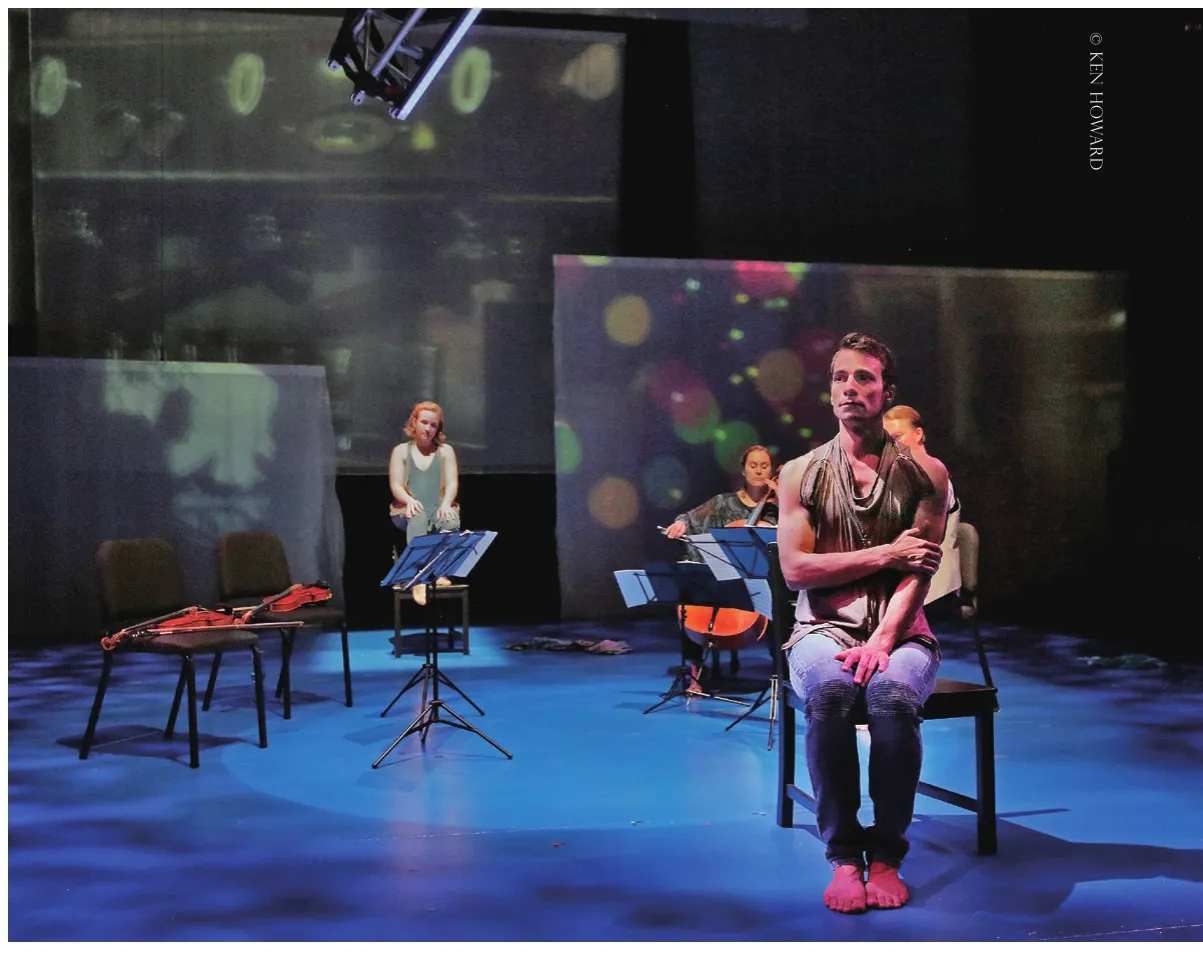
歌剧《一致》2014年首演剧照
Originally premiered in 2014,As Onealready lays claims to being the most-produced opera of the 21stcentury—a credible assertion, since the piece only requires two singers and a string quartet. WhereStonewallhad a dozen characters to keep straight(so to speak),As Onehas a single character played by two singers, a baritone “before” and a mezzosoprano “after.” Laura Kaminsky’s post-minimalist score maintains a constant rhythmic pulse, the music palpably changing with the character’s gender. Episodes unfold much like self-contained songs. IfStonewallwas essentially a pageant,As Oneis a glorified cabaret set. Where none of the characters inStonewallhas any time to reflect as events barrel forward,As Oneis practically all aria.UnlikeStonewall, where opposition comes from without, conflict inAs Onecomes mostly from within. City Opera has already shown that LBGT history contains many stories. Sometimes, more than one comes from the same person.
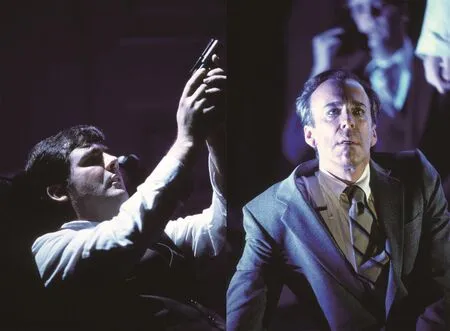
左页:歌剧《哈维·米尔克》剧照
(As an aside, a recording ofAs Oneis due any day now by American Opera Projects, who commissioned the work, featuring mezzo-soprano Sasha Cooke and baritone Kelly Markgraf, who originated the roles. The last time I saw Cooke and Margraff, who are married,perform together was in Leonard Bernstein’sTrouble in Tahitiin Taipei. I tried to imagine stranger casting than an actual couple playing a couple with marital problems. Now they play the same person.)
If City Opera plans to continue its pledge to the LBGT community—and so far, it’s pretty much the only commitment the company hasn’t broken—they need to get around toHarvey Milk, especially considering the hash the old City Opera made of the piece when it first appeared in 1995. Composer Stewart Wallace and librettist Michael Korie (whoseHopper’s Wifeappeared in City Opera’s 2016 season) had written a “biopera”of the San Francisco legislator and gay activist as part of a cocommission with Houston Grand Opera, New York City Opera and San Francisco Opera.
I saw the premiere in Houston,where the opera’s energy was infectious but its structure amess. A few months later in New York, it didn’t even have the energy. Conductor Christopher Keene,then City Opera’s general director, led woefully under-rehearsed performances before dying of AIDS a few months later. But after some astute revisions,the opera was a huge success the next year in San Francisco, with a subsequent recording released internationally on Teldec.
There are a couple of lessons here, particularly as Stonewall is in discussions for future performances at London’s Opera Holland Park and Paris’s Théâtre des Champs-Elysées. Both musically and visually,Harvey Milkwas the spectacle thatStonewallwanted to be.But more than that, it proved that where new works are concerned, the past can be merely prelude.
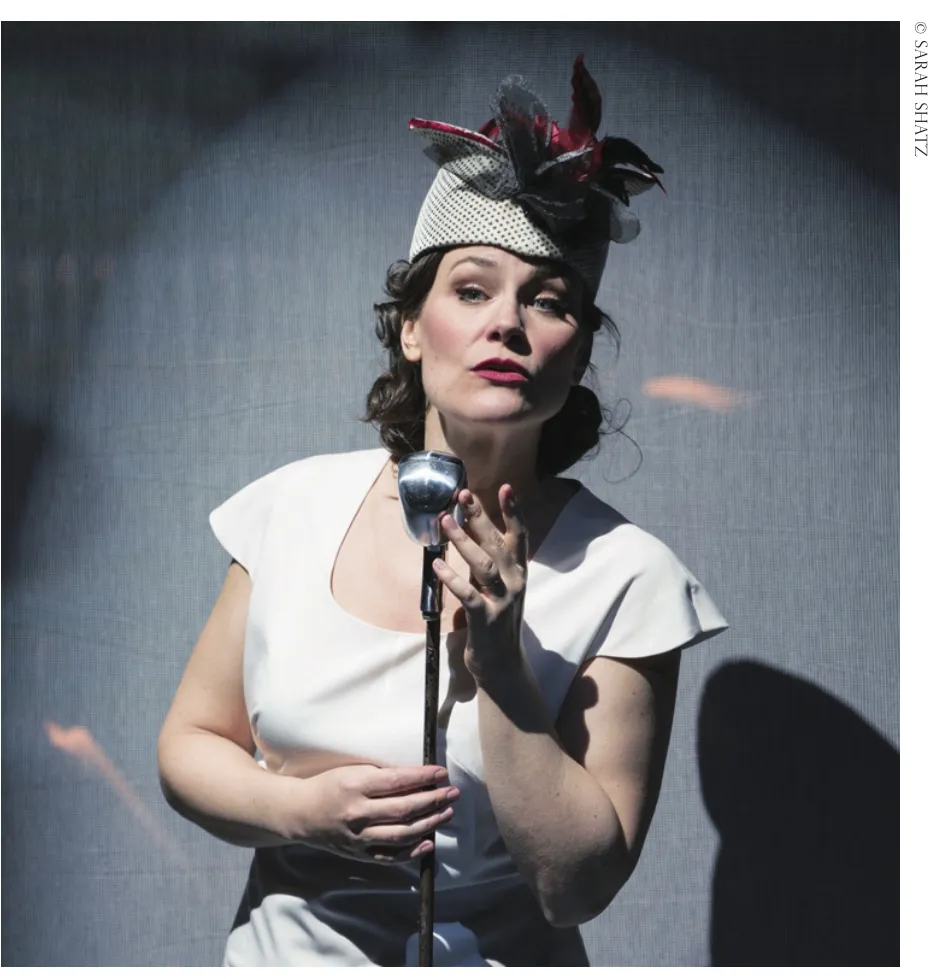
上:纽约市立歌剧院2016年演出季上演的《霍普之妻》剧照
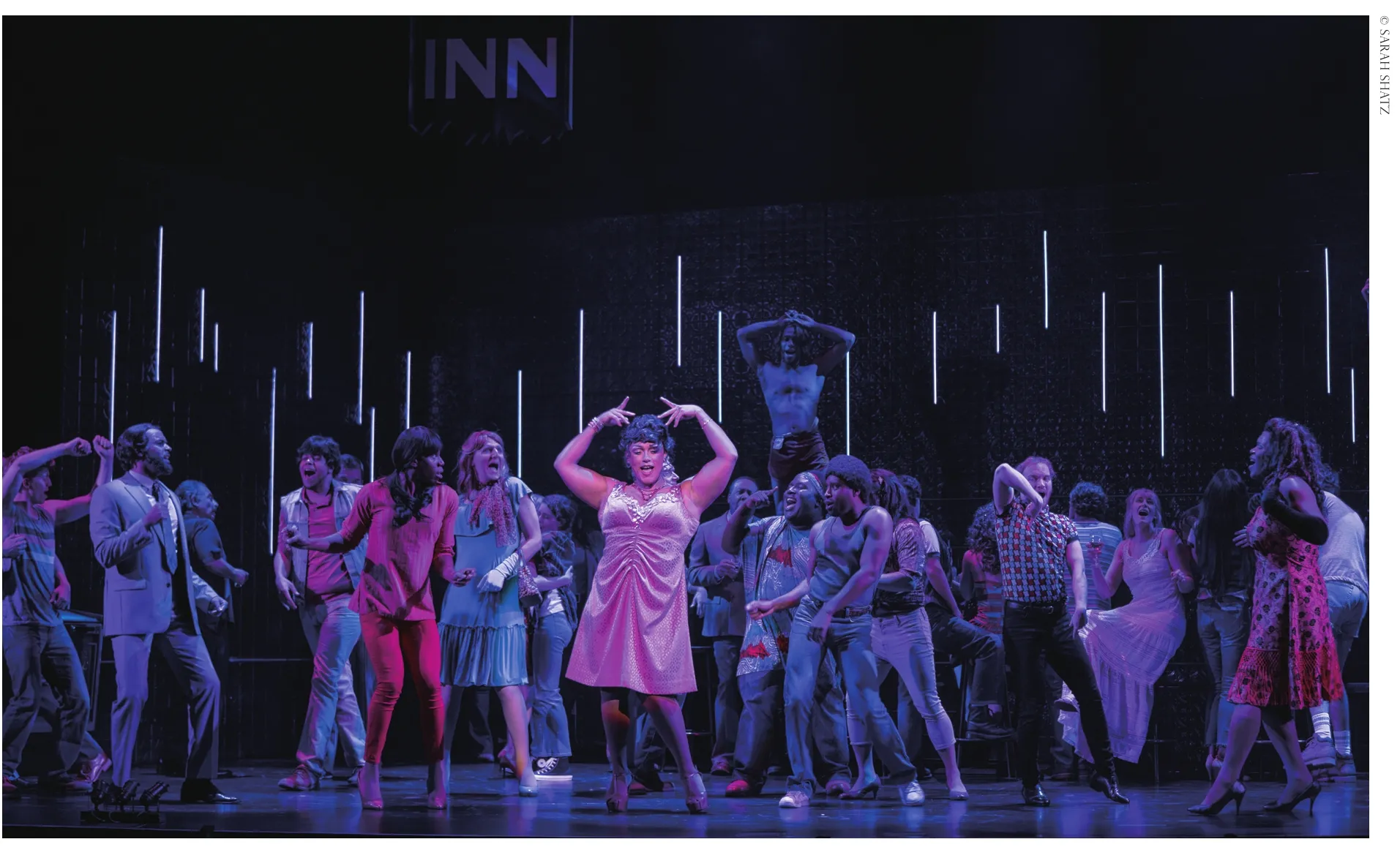
下:纽约市立歌剧院制作的歌剧《石墙》剧照

